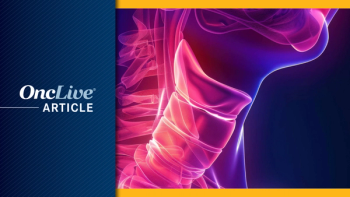
Debio 1143 Significantly Boosts OS in High-Risk Head and Neck Cancer
Debio 1143 in combination with standard cisplatin-based concomitant fractionation chemoradiation therapy was found to induce a statistically and clinically significant improvement in overall survival compared with CRT alone in patients with high-risk locally advanced squamous cell carcinoma of the head and neck.
Debio 1143 in combination with standard cisplatin-based concomitant fractionation chemoradiation therapy (CRT) was found to induce a statistically and clinically significant improvement in overall survival (OS) compared with CRT alone in patients with high-risk locally advanced squamous cell carcinoma of the head and neck (LA-SCCHN), according to Debiopharm, the drug developer.1
Three-year follow-up data from the phase 2 trial demonstrated that the potential first-in-class inhibitor of apoptosis protein (IAP) antagonist in combination with CRT reduced the risk of mortality by half compared with CRT alone (P = .0261).
Moreover, the findings were found to have confirmed the 2-year outcomes from the trial that had previously been reported, with the combination showing continued, statistically significant improvements across all key trial end points, including a two-fold increase in progression-free survival (PFS) rate and superior duration of response compared with CRT alone. At 3 years, no significant changes in the safety profile of the combination were reported.
“These 3-year follow-up results could have major implications for high-risk [patients with] head and neck cancer, especially those with negative HPV status who appear to be associated with the poorest prognosis,” Professor Jean Bourhis, department head of Radio-Oncology at the University Hospital of Lausanne and lead investigator of the study, stated in a press release. “As the compound is now advancing into phase 3 [studies], we will be able to gather further evidence for this radio-chemo enhancing IAP antagonist that has the potential to become a standard-of-care treatment for radiation oncology.”
In February 2020, a
At 3 months, Debio 1143/CRT resulted in a 62.5% overall response rate (ORR), which increased to 66.7% at 6 months; the ORR in the placebo/CRT arm went from 66.7% at 3 months to 47.9% at 6 months. Notably, a delayed effect was observed at 6 months following treatment with the investigational combination.
Updated results published in the Lancet Oncology showed that at a median follow-up of 25.0 months in the Debio 1143 arm (n = 48) and 24.2 months in the CRT-alone arm (n = 48), the 18-month LCR rates were 54% (95% CI, 39-69) and 33% (95% CI, 20-48), respectively (OR, 2.69; 95% CI, 1.13-6.42; P =.026).3
In the 2-part phase 1/2 trial, investigators set out to examine the optimal dose for the combination, as well as the safety and efficacy of the approach, in treatment-naïve patients with LA-SCCHN.
To be eligible for enrollment, patients had to have stage III, IVa, or IVb, disease, a smoking history of more than 10 pack-years, and an ECOG performance status of 0 or 1; they could not have HIV, hepatitis B, or hepatitis C. Tumor sites could include the oral cavity, hypopharynx, larynx, and oropharynx that was HPV/p16-positive or -negative. Those who did not have compensated liver cirrhosis, who were older than 75 years, and who were not candidates for cisplatin chemotherapy were not permitted to participate.
In the phase 1 dose-escalation portion of the trial, investigators set out to identify the maximum-tolerated dose (MTD) of Debio 1143 in combination with CRT. Once the MTD was determined, which was 200 mg daily, the phase 2 portion of the research randomized a total of 94 participants to receive either Debio 1143 plus concomitant CRT or placebo plus concomitant CRT.
The investigational IAP antagonist was given orally or via feeding tube on a daily basis for 14 days, every 3 weeks. The chemotherapy was composed of 3 cycles of cisplatin, given as a 1-hour infusion on days 2, 23, and 44, 30 minutes after Debio 1143 was administered. Radiation was standard fraction radiotherapy delivered daily to the primary tumor for 5 days per week over the course of 7 weeks.
For the trial, patients were stratified by N0/N1 and N2/N3 stage and primary tumor site. Baseline characteristics were well balanced between the 2 treatment arms. The majority of patients whose disease originated from the oropharynx, or 80%, had HPV/p16-negativity. All participants had high-risk disease, were heavy smokers, and had high alcohol consumption. Eighty percent of patients had stage IV disease.
The primary end point of the phase 2 trial was LCR at 18 months from the end of CRT, and key secondary end points included complete response rate, ORR, 6-month LCR, PFS, distant relapse rate, disease-specific survival rate at 1 and 2 years, OS, and safety.
With regard to safety, grade 3 or higher adverse effects (AEs) were reported in 85% of patients on the investigational arm versus 87% of those on the control arm. The most commonly reported grade 3 or 4 AEs in the Debio 1143 arm and the CRT-alone arm included dysphagia (50% of patients on Debio 1143 vs 21% on CRT alone, respectively), mucositis (31% vs 21%), and anemia (35% vs 23%).
Moreover, serious treatment-emergent toxicities were observed in 63% and 60% of those on the investigational and control arms, respectively. Two patients on the placebo arm died because of AEs, but neither case was determined to be related to the treatment. No deaths due to AEs were reported in the Debio 1143 arm.
Debio 1143 is poised to enter into a phase 3, pivotal trial that is planned to launch September 2020; this trial will continue to examine the investigational IAP antagonist in combination with CRT in patients with head and neck cancer. To date, over 200 patients have received treatment with Debio 1143 in various indications and lines of therapy, and the drug has shown a consistently well tolerated toxicity profile across research efforts, according to Debiopharm.
References
- Debiopharm’s IAP antagonist significantly improves overall survival of high-risk head & neck cancer patients. News release. Debiopharm. August 13, 2020. Accessed August 13, 2020.
https://prn.to/31NulIb . - Bourhis J, Sun X, Pointreau Y, et al. Double-blind randomized phase 2 results comparing concurrent high-dose cisplatin chemorradiation (CRT) plus Debio 1143 or placebo in high-risk patients with locally advanced squamous cell carcinoma of the head and neck (SCCHN): a GORTEC study. Ann Oncol. 2019;30(suppl 5):v851-v934. doi:10.1093/annonc/mdz394.
- Sun X-S, Tao Y, Tourneau CL, et al. Debio 1143 and high-dose cisplatin chemoradiotherapy in high-risk locoregionally advanced squamous cell carcinoma of the head and neck: a double-blind, multicentre, randomised phase 2 study. Lancet Oncol. Published online August 2020. doi:10.1016/S1470-2045(20)30327-2


































